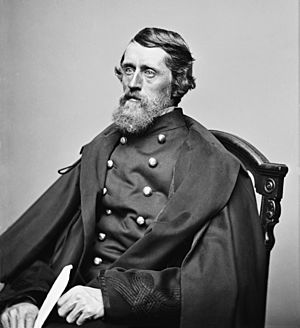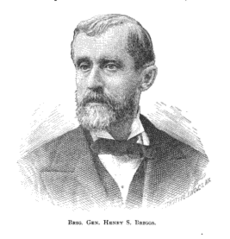Henry Shaw Briggs facts for kids
Quick facts for kids
Henry Shaw Briggs
|
|
|---|---|
 |
|
| Justice of the Central Berkshire District Court | |
| In office 1869–1873 |
|
| Succeeded by | Joseph Tucker |
| 8th Massachusetts Auditor | |
| In office 1866–1870 |
|
| Governor | Alexander H. Bullock William Claflin |
| Preceded by | Julius L. Clarke |
| Succeeded by | Charles Endicott |
| Police Justice of the Town of Pittsfield, Massachusetts |
|
| In office 1857–1857 |
|
| Member of the Massachusetts House of Representatives | |
| In office January 1856 – June 1856 |
|
| Personal details | |
| Born | August 1, 1824 Lanesborough, Massachusetts |
| Died | September 23, 1887 (aged 63) Pittsfield, Massachusetts |
| Resting place | Pittsfield Cemetery, Pittsfield, Massachusetts |
| Nationality | American |
| Political party | Republican |
| Spouse | Mary Elizabeth Talcott |
| Children | Mary Talcott Briggs |
| Alma mater | Williams College, class of 1844 |
| Military service | |
| Allegiance | United States of America Union |
| Branch/service | United States Army Union Army |
| Years of service | 1861–1865 |
| Rank | |
| Commands |
|
| Battles/wars | American Civil War, Peninsula Campaign, Battle of Seven Pines |
Henry Shaw Briggs (born August 1, 1824 – died September 23, 1887) was an important figure in American history. He served as a brigadier general in the Union Army during the American Civil War. After the war, he became a successful lawyer and politician.
Briggs held several important jobs. He was a state legislator, which means he helped make laws. He also served as the Massachusetts Auditor, managing state money. Later, he became a judge.
Contents
Henry Shaw Briggs: Early Life
Henry Briggs was born on August 1, 1824, in Lanesborough, Massachusetts. His father, George N. Briggs, was the governor of Massachusetts for many years. Henry went to Williams College and finished in 1844. He then studied law and became a lawyer in Massachusetts in 1848.
In 1849, Henry Briggs married Mary Elizabeth Talcott. She was the daughter of Nathianiel P. Talcott from Lanesborough.
Before the Civil War, Briggs started his own law office in Pittsfield, Massachusetts. He was also interested in military matters. He became the captain of a local state militia group called the "Allen Guards." Briggs also got involved in politics. In 1856, he was elected to the Massachusetts Legislature.
Serving in the Civil War
When the Civil War began, Henry Briggs joined the Union Army. He played a key role in several parts of the war. His leadership helped shape the actions of his troops.
Joining the 8th Massachusetts
After the attack on Fort Sumter, Briggs's local militia company became Company K of the 8th Massachusetts Regiment. His company was sent to Fort McHenry near Baltimore, Maryland. They helped guard the fort and repair railroads in the area. This work was important for moving supplies and troops.
Leading the 10th Massachusetts
In June 1861, Briggs was promoted to colonel. He was given command of the new 10th Massachusetts Regiment. The regiment moved to Washington, D.C. They spent the rest of 1861 training and getting ready for battle. The 10th Massachusetts later became part of the IV Corps.
In March 1862, Major General George B. McClellan started the Peninsular Campaign. This plan aimed to capture the Confederate capital, Richmond, Virginia. Colonel Briggs was put in charge of a larger group, the 1st Brigade. This was part of the 1st Division of the IV Corps.
The 10th Massachusetts, led by Briggs, fought its first major battle at the Battle of Fair Oaks on May 31, 1862. The regiment suffered many losses. Colonel Briggs was seriously wounded, shot in both legs.
Leading Larger Groups
Because of his serious injuries, Briggs had to leave command of the 10th Massachusetts. He went back to Massachusetts to recover. For his bravery at the Battle of Fair Oaks, Briggs was promoted to brigadier general in July 1862.
After recovering, Briggs was given new assignments. In September 1862, he commanded Camp Chase. This was a training camp for new regiments arriving in Washington. He also briefly led a brigade during the Maryland Campaign. However, his wounds made it hard for him to stay in the field.
In February 1863, Briggs was assigned to the Army's Middle Department. He commanded a brigade in the VIII Corps in Maryland. His headquarters were in Baltimore. He served in this role until July 1863.
For a short time in July 1863, Briggs commanded a brigade in the I Corps. This was during the Confederate retreat from Gettysburg. His brigade did not see much fighting then. From August 1863 to July 1864, Briggs was in charge of a training camp in Alexandria, Virginia. This camp was for new soldiers joining the army.
From July 1864 until he left the army in December 1865, Briggs served on legal panels in Washington.
Life After the War
After the war, Henry Briggs went back to his career in law and politics. From 1865 to 1868, he served as the Massachusetts Auditor. This job involved overseeing the state's finances.
In 1869, a new court was created in Central Berkshire. Briggs was appointed as a standing judge for this court. This was because of his experience as a lawyer and his work on legal panels during the war. He resigned from being a judge in 1873.
Henry Briggs passed away from heart disease on September 23, 1887.
Images for kids
 | Victor J. Glover |
 | Yvonne Cagle |
 | Jeanette Epps |
 | Bernard A. Harris Jr. |


